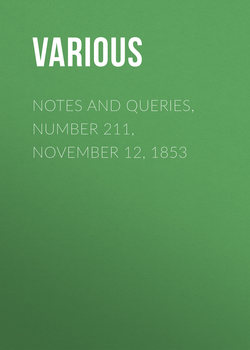Читать книгу Notes and Queries, Number 211, November 12, 1853 - Various - Страница 2
Notes
CHANGE OF MEANING IN PROVERBIAL EXPRESSIONS
ОглавлениеI entirely agree with G. K. (Vol. viii., p. 269.) respecting the original sense of "Putting a spoke in one's wheel." It surely meant to aid him in constructing the wheel, say of his fortune. As the true sense of this expression seems to have been retained in America when lost in its birthplace, so Ireland has retained that of another which has changed its sense here. By "finding a mare's nest" is, I believe, meant, fancying you have made a great discovery when in fact you have found nothing. I certainly remember the late Earl Grey using it in that sense in his place in parliament. But how does this accord with the following place in Beaumont and Fletcher?
"Why dost thou laugh?
What mare's nest hast thou found?"
—Bonduca, Act V. Sc. 2.
on which, rather to my surprise, Mr. Dyce has no note. Now in Ireland, when a person is seen laughing immoderately without any apparent cause, it is usual to say, "O, he has found a mare's nest, and he's laughing at the eggs." This perfectly agrees with the above passage from Bonduca, and is doubtless the original sense and original form of the adage.
There is another of these proverbial expressions which, I think, has also lost its pristine sense. By "Tread on a worm and it will turn" is usually meant that the very meekest and most helpless persons will, when harshly used, turn on their persecutors. But the poor worm does, and can do, no such thing. I therefore think that the adage arose at the time when worm was inclusive of snake and viper, and that what was meant was, that as those that had the power to avenge themselves when injured would use it, so people should be cautious how they provoked them. I am confirmed in this view by the following passage in the Wallenstein's Tod of Schiller, Act II. Sc. 6.:
"Doch einen Stachel gab Natur dem Wurm,
Dem Willkür übermüthig spielend tritt."
Thos. Keightley.
